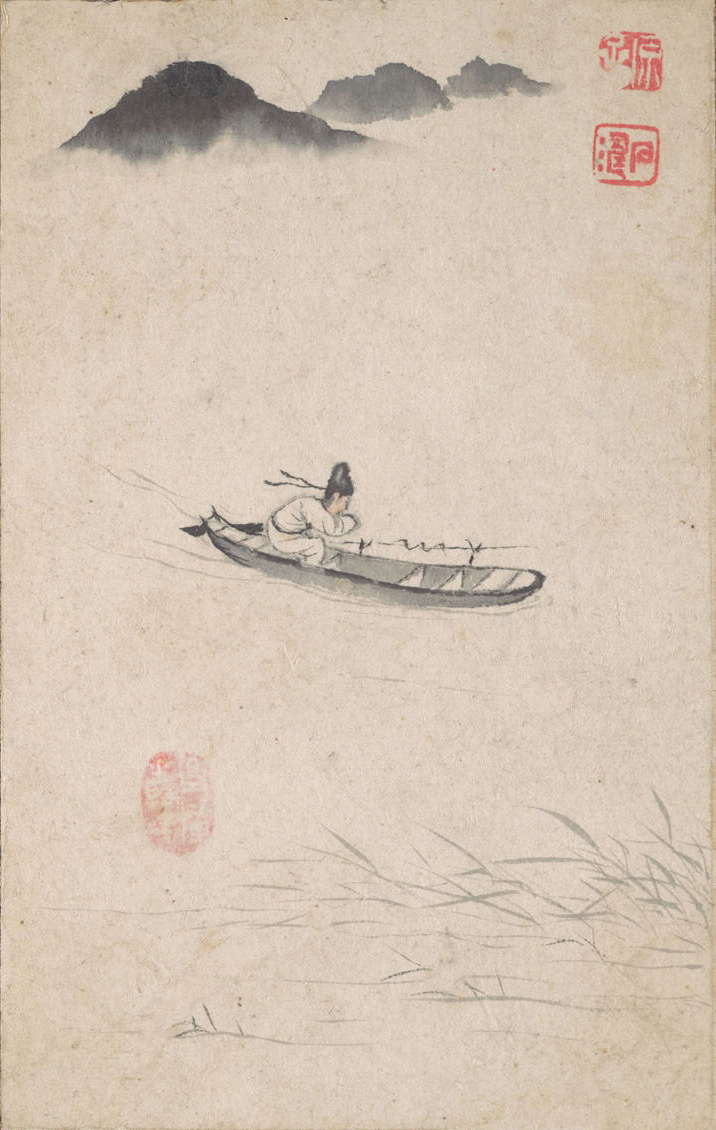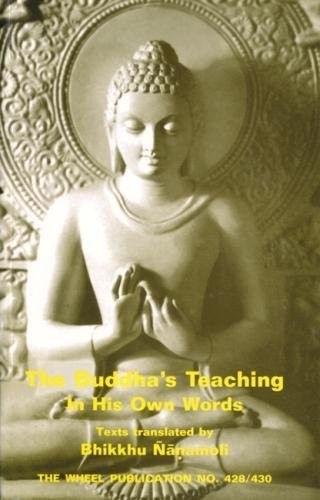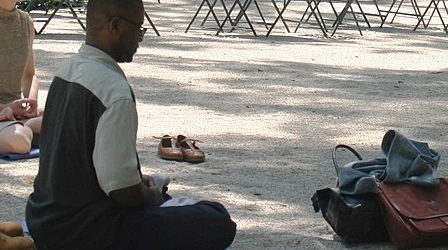The Buddhist Path
Subscribe to this topic via: RSS
The progressive practice which leads to liberation.

"Coming Home" (歸棹) 1695. Painting #5 by Shí Tāo (石濤).
The Met
The Buddha often compared his teachings to a raft which ferries beings across a dangerous river to a far shore of safety: nibbāna. In a poem facing this swift and foggy river, Yuán Jǐ (原濟) wrote:
⟨ 放眼江天外,賒心寸草亭。⟩
"Looking beyond the river and sky, lose [your] heart in a grass hut."
Table of Contents
- Books (40)
- Canonical Works (130)
- Readings (48)
- Audio/Video (25)
- Reference Shelf (1)
- Related Topics (4)
Books (40)
Featured:
-
🥇 Best of
-
⭐ Recommended
[In Buddhism, morality] is not concerned so much with the result of one’s actions on other people as it concerns the result of one’s actions on one’s own mind.
-
⭐ Recommended
Tucked away in the Samyutta Nikāya among the “connected sayings on causality” is a short formalized text entitled the Upanisa Sutta, the “Discourse on Supporting Conditions.” Though at first glance hardly conspicuous among the many interesting suttas in this collection, this little discourse turns out upon repeated examination to be of tremendous doctrinal importance.
See also:
Canonical Works (130)
Featured:
-
⭐ Recommended
‘Others will be cruel; we shall not be cruel here’
-
And even those disciples of his who fall out with their companions in the holy life and abandon the training to return to the low life—even they praise the Master and the Dhamma and the Sangha; they blame themselves instead of others, saying: “We were unlucky, we have little merit”
-
⭐ Recommended
Diverse problems demand a diverse range of responses. Rather than selling a “one size fits all” solution, in this sutta the Buddha outlines seven methods for dealing with the afflictions of life and in so doing gives us a comprehensive overview of Buddhist practices.
-
⭐ Recommended
So this holy life, bhikkhus, does not have gain, honour, and renown for its benefit, or the attainment of virtue for its benefit, or the attainment of concentration for its benefit, or knowledge and vision for its benefit. But it is this unshakeable deliverance of mind that is the goal of this holy life, its heartwood, and its end.
-
… a monk who is endowed with these fifteen factors including exertion, it is possible for [him to attain] breakthrough, it is possible for [him to attain] awakening, it is possible for [him to attain] arrival at unsurpassable security from bondage.
-
⭐ Recommended
if occasionally, due to a lapse of mindfulness, evil unwholesome memories and intentions connected with the fetters arise in him, slow might be the arising of his mindfulness, but then he quickly abandons them, dispels them, puts an end to them
-
The Faculty of Faith, the Faculty of Energy, the Faculty of Mindfulness, the Faculty of Concentration, the Faculty of Wisdom.
-
⭐ Recommended
Once upon a time, householder, there was a brahmin named Velāma…
-
⭐ Recommended
When you live with good friends, good companions, and good associates, you should live supported by one thing: diligence in wholesome qualities.
-
⭐ Recommended
I saw this population flounder,
like a fish in a little puddle.
Seeing them fight each other,
fear came upon me. -
⭐ Recommended
Meghiya, when the heart’s release is not ripe, five things help it ripen. What five? Firstly, a mendicant has good friends…
-
Venerable Ānanda discusses the qualities of a noble trainee.
-
… a young tender infant lying prone does not even have the notion ‘identity,’ so how could identity view arise in him?
5 pages -
The Vattha Sutta is a beautiful and somewhat unusual description of the path to stream entry and beyond.
-
But because it is known by me, seen, found, realised, contacted by wisdom thus: ‘Here, when someone feels a certain kind of pleasant feeling, unwholesome states increase in him and wholesome states diminish,’ that I therefore say: ‘Abandon such a kind of pleasant feeling.’
-
When they’ve been given up and eliminated, there are fine corruptions: thoughts of family, country, and being looked up to. A sincere, capable mendicant gives these up, gets rid of, eliminates, and obliterates them.
-
Mendicants, these six things are unsurpassable. What six? The unsurpassable seeing, listening, acquisition, training, service, and recollection.
-
Concentration through mindfulness of in-&-out breathing, when developed & pursued, brings the four establishings of mindfulness to completion. The four establishings of mindfulness, when developed & pursued, bring the seven factors for awakening to completion. The seven factors for awakening, when developed & pursued, bring clear knowing & release to completion.
-
It is natural that non-regret arises in a virtuous person, one whose behavior is virtuous.
-
All of the monks and nuns who declare in my presence that they have attained perfection, did so by one or other of four paths.
-
They focus on the cessation of identification, and their mind is eager, confident, settled, and decided about it. You’d expect that mendicant to stop identifying.
-
give up sense pleasures even if it’s painful:
they call this person “one who goes against the stream.” -
The powers—faith, energy, conscience, prudence, mindfulness, immersion, and wisdom—defined.
-
A seed sown in a field that possesses these eight factors brings forth abundant fruits, its fruits are delectable, and it yields a profit.
-
Reverends, what is the vital condition for the development of the awakening factors?
-
This divine vehicle unsurpassed
Originates from within oneself.
The wise depart from the world in it,
Inevitably winning the victory. -
Those bhikkhus who are accomplished in virtue, accomplished in concentration, accomplished in wisdom, accomplished in liberation, accomplished in the knowledge and vision of liberation: even the sight of those bhikkhus is helpful
-
Whatever Arahants, Perfectly Enlightened Ones arose in the past, all those Blessed Ones had first abandoned the five hindrances, corruptions of the mind and weakeners of wisdom; and then, with their minds well established in the four establishments of mindfulness, they had developed correctly the seven factors of enlightenment; and thereby they had awakened to the unsurpassed perfect enlightenment.
-
Venerable Sāriputta explains how a faithful disciple uses their faith to develop the path.
-
The faculty of conviction, the faculty of persistence, the faculty of mindfulness, the faculty of concentration, & the faculty of discernment.
-
… how a wise lay follower should advise another wise lay follower who is sick
-
⭐ Recommended
Of these Four Noble Truths, there is one to be completely understood, one to be abandoned, one to be realized, and one to be developed.
-
⭐ Recommended
Karotha buddhasāsanaṁ
Do what the Buddha taught… -
⭐ Recommended
I am not lazy nor conceited,
so why have I not attained Nirvana? -
… in three cases one may be understood to have faith and confidence
-
To give up these five weaknesses in your training you should develop the four kinds of mindfulness meditation.
-
… a bhikkhu who is without ardour and without fear of wrongdoing is incapable of attaining enlightenment
-
When mindfulness of breathing is well-established internally in front of you, there will be no distressing external thoughts or wishes. When you meditate observing the impermanence of all conditions, ignorance is given up and knowledge arises.
-
One should not pursue a course
That is painful and harmful. -
The wanderer Sāmaṇḍaka asks Sāriputta what is difficult to do.
-
through nonclinging find delight
In the relinquishment of grasping -
The faculties of faith, energy, mindfulness, immersion, and wisdom are the five faculties.
-
if you practice fully you succeed fully. If you practice partially you succeed partially. These five faculties are not a waste…
-
The Buddha defines the five spiritual faculties.
-
Association with people of integrity, lord, is a factor for stream entry.
-
I’ve entered the path to realize freedom from death
-
It smashes the mechanism of deeds,
And drops the thunderbolt of knowledge
On the taking up of consciousnesses. -
I was a householder
when I heard the Dhamma…
See also:
Readings (48)
Featured:
-
⭐ Recommended
… the eightfold path is but one of several differently worded statements of Gotama’s course of practice
-
🥇 Best of
Kammaṭṭhāna meditation should be practised so as to reach Nibbāna, thereby escaping from all kinds of misery
-
⭐ Recommended
Doing any one Buddhist practice in isolation can cause an unbalanced effect, but doing the path together shows more balance. This interesting paper shows that mindfulness meditation decrease amygdala responses even when not meditating, while compassion meditation has the opposite effect. Far from canceling each other out, of course, these practices combine to not alter our neurochemistry, but rather to radically rewire the brain.
-
⭐ Recommended
There is no single “swiss-army knife” technique that works equally well at all times; instead, we must carefully examine our present conditions and determine what practice is most relevant.
-
… how lust, hatred, delusion and other negative emotions are considered to cause physical and mental pain among [unenlightened beings]
-
A dense and Pāli-laden survey explaining the different kinds of vimutti (liberation).
-
… meditation is carried out for the purpose of realising nibbāna and thereby escaping from the ills of life
-
Effort plays a central role in the Buddhist Path, yet needs to applied skillfully and in a balanced manner.
-
The same scanning procedure can be employed for the next body contemplation, which instead takes up the four elements as basic constituents of matter in general and the human body in particular. These four are earth, water, fi re, and wind, which represent the qualities of solidity or hardness, cohesion or wetness, temperature, and motion.
-
So, keep on practicing. There’s nothing to be afraid of. You’ll have to reap results, there’s no doubt about it.
-
With your own mind under control, help others in any way you can,
And take whatever you experience onto the path to liberation.
See also:
Audio/Video (25)
Featured:
-
⭐ Recommended

-
⭐ Recommended

-
Ayya Santussika gives a guided meditation, followed by a talk about her own practice of The Sallekha Sutta.
-
A more detailed commentary on MN 2 (the Sabbāsava Sutta).
-
An introduction to the contemplation of the Buddha and the use of faith on the path.
-
… someone with this wholesome state of mind looks at unwholesome, unkind actions and speech in the same way as if he were invited to excrete in the middle of a marketplace
See also:






